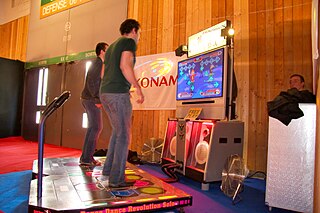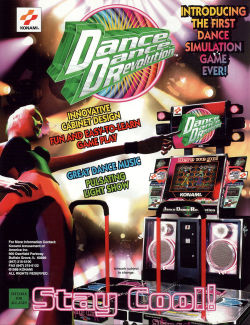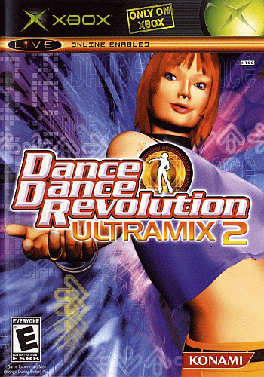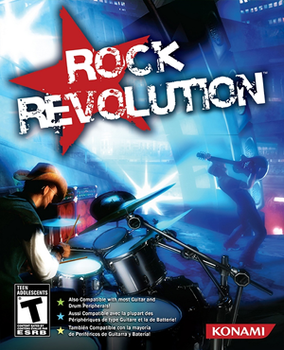Dance Dance Revolution (DDR) is a music video game series produced by Konami. Introduced in Japan in 1998 as part of the Bemani series, and released in North America and Europe in 1999, Dance Dance Revolution is the pioneering series of the rhythm and dance genre in video games. Players stand on a "dance platform" or stage and hit colored arrows laid out in a cross with their feet to musical and visual cues. Players are judged by how well they time their dance to the patterns presented to them and are allowed to choose more music to play to if they receive a passing score.

Beatmania (ビートマニア) is a rhythm video game developed and distributed by Japanese game developer Konami and first released in December 1997. It contributed largely to the boom of music games in 1998, and the series expanded not only with arcade sequels, but also moved to home consoles and other portable devices, achieving a million unit sales. The Bemani line of music games from Konami is named after the series, was first adopted in the arcade release of Beatmania 3rdMix and kept ever since. The series came to an end with the last game being Beatmania The Final, released in 2002.
Dancing Stage is a series of music video games developed and published by Konami. It is a spin-off of Dance Dance Revolution for the European market as well as a few Japanese titles. Games were released for arcade, PlayStation, PlayStation 2 and Wii.

Beatmania IIDX is a series of rhythm video games, that was first introduced by Konami in Japan on February 26, 1999. IIDX has since spawned 31 arcade releases and 14 console releases on the Sony PlayStation 2. It is the sequel to the beatmania game series, and part of the Bemani line of music games. A PC release titled beatmania IIDX INFINITAS has been released, beginning alpha testing in September 2015, and was heavily updated to a new version in 2020.
Bemani, stylized as BEMANI, is Konami's music video game division. Originally named the Games & Music Division (G.M.D.), it changed its name in honor of its first and most successful game, Beatmania, and expanded into other music-based games, most notably rhythm games such as Dance Dance Revolution, Guitar Freaks, and Drum Mania.

GuitarFreaks (ギターフリークス) is a music video game series produced by Konami. It is a rhythm game where the player uses a controller to simulate the playing of an electric guitar. The game consists of music predominantly from the rock music, rock and roll and J-pop genres. It is considered one of the most influential video games of all time, for having laid the foundations for popular guitar-based rhythm games, such as the Guitar Hero series. Working Designs attempted to bring Guitar Freaks PlayStation 2 games in the U.S., but patent problems with the guitar controller prevented the project from moving forward.
BeForU were a Japanese pop group that performed music primarily for the Bemani series of rhythm games. Their 2000 debut song "Dive" was particularly notable as being the first Japanese-language pop song in the Dance Dance Revolution series. BeForU was produced by Naoki Maeda, one of the lead Konami musical producers. In 2006, the group made their major label debut under Avex Trax.

Rhythm game or rhythm action is a genre of music-themed action video game that challenges a player's sense of rhythm. Games in the genre typically focus on dance or the simulated performance of musical instruments, and require players to press buttons in a sequence dictated on the screen. Many rhythm games include multiplayer modes in which players compete for the highest score or cooperate as a simulated musical ensemble. Rhythm games often feature novel game controllers shaped like musical instruments such as guitars and drums to match notes while playing songs. Certain dance-based games require the player to physically dance on a mat, with pressure-sensitive pads acting as the input device.

Dance Dance Revolution (DDR), is a music video game, developed by Konami, released in arcades on September 26, 1998 in Japan. Dance Dance Revolution is a unique game involving dance and rhythm that defined the genre. It involves timing and balance by having players use their feet instead of their hands like typical video games. In March 1999, the game was released for North American arcades, and for European arcades under the name Dancing Stage. Dance Dance Revolution is cited as one of the greatest video games ever made. Players and game critics were caught off-guard by the game's addictive qualities winning the new franchise many merits to its design.

Dance Dance Revolution SuperNova, released in Europe as Dancing Stage SuperNova, is an arcade and PlayStation 2 game in the Dance Dance Revolution (DDR) series of music video games. It was produced by Konami and released through Betson Enterprises. The game was released in Europe on April 28, 2006, followed shortly by a North American release on May 15 and a Japanese release on July 12.

Dance Dance Revolution Solo is a short-lived series of games spun off of the main Dance Dance Revolution series. It consists of three arcade releases in Japan. The game mode was also adapted for use in a children's arcade version and two console releases.

Dance Dance Revolution Ultramix 2, or simply Ultramix 2, is a music rhythm video game released on November 18, 2004 by Konami in American markets for the Microsoft Xbox.

Beatmania IIDX is an arcade music video game developed by Bemani and published by Konami. It was released in Japan on February 26, 1999. The objective is to perform songs using a controller with seven keys and a turntable. After the surprise success of Beatmania, Benami conceived IIDX to simulate an actual disc jockey (DJ) live performance. Its arcade cabinet contains a widescreen monitor, speakers, and eight spotlights. Bemani later developed several updated versions of IIDX to increased success. The game retrospectively received a positive reception from video game publications for its gameplay and increased difficulty. A sequel, Beatmania III, was released in 2000.

Rock Revolution is a music video game developed by Zoë Mode and HB Studios and published by Konami. The game was released on 15 October 2008 for the Nintendo DS, PlayStation 3, Wii and Xbox 360. As with similar titles, the game uses various controllers to simulate the performance of rock music, primarily using guitar and drum controllers on its Xbox 360 and PlayStation 3 versions.
Dance Dance Revolution Extreme has a robust soundtrack. It includes many licensed tracks as well as in-house original music that was written and performed by Konami staff.

The System 573 is an arcade system board made by Konami based on the original PlayStation. The hardware was used primarily for Konami's Bemani series of music video game arcades, including the popular Dance Dance Revolution series introduced in 1998. The System 573 is available is configurable with various expansion IO boards to add extra input or output, such as the analog and digital I/O boards for Dance Dance Revolution and other Bemani games. Systems with these IO boards are often called System 573 Analog and System 573 Digital respectively. There is also another variant called the System 573 Satellite Terminal which allows for up to 8 cabinets to be networked to a central one.

Beatmania IIDX 18 Resort Anthem is a music video game in the Beatmania IIDX series of games by Konami. On April 19, 2010, Bemani fansite Zenius -I- Vanisher reported that Konami had announced the first location test for the newest game in the IIDX series. The location test ran from April 22 to April 26 at the Cat's Eye Machida (キャッツアイ町田) in Machida, Tokyo. Follow-up location tests ran in Chōfu, Tokyo and Kyoto from April 30 to May 6, in Nagoya and Sapporo from May 14 to May 20 and in Chiyoda, Tokyo from June 11 to June 12. The game was released on September 15, 2010 This Beatmania iteration's theme focuses heavily on a futuresque modern relaxation and tropical beach resort concert-like setting, with the interface making use of sleek mechanical components with simple whites and bright colors that are easy on the eyes.
Dance Dance Revolution (DDR) is a music video game, the 14th installment of the Dance Dance Revolution series, and the sequel to Dance Dance Revolution X3 vs. 2ndMix. The game was revealed by Konami on October 24, 2012. Public beta testing commenced on October 26, 2012. It was released in Japan on March 14 and 21, 2013 for dedicated cabinets and upgrade kits, respectively, and in Asia on March 21, 2013. A limited test release occurred at select locations in the United States, beginning on August 4, 2015.

Dance Dance Revolution A20 is a music video game, the 17th installment of the Dance Dance Revolution arcade series in Japan, and the sequel to Dance Dance Revolution A. The game was released on new, golden cabinets on March 20, 2019 in Japan. A software upgrade for older cabinets for Japan and Asia was released on July 24, 2019, with South Korea receiving a localized release on August 1, 2019, and North America on September 24, 2019. A location test in Europe began on October 7, 2019, and ended on March 16, 2020.













